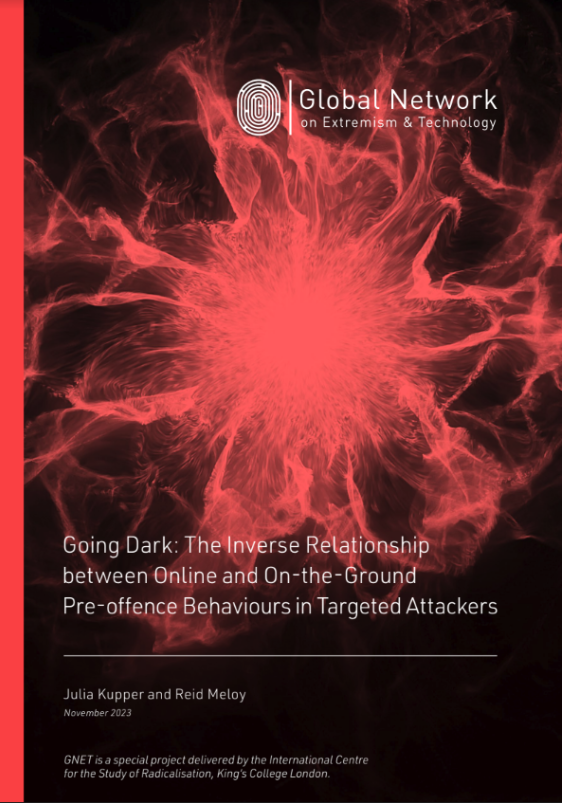Welcome to the October edition of the Global Network on Extremism and Technology (GNET) research digest.
Your digest contains a selection of relevant news, research, academic journal articles, and GNET Insights relating to terrorist use of technology.
GNET Report Launch:
Going Dark: The Inverse Relationship between Online and On-the-Ground
Pre-offence Behaviours in Targeted Attackers

Where: Online, via Zoom
When: Thursday 2 November 2023, 17:00 GMT/ 13:00 EST
What: 30-minute presentation of report findings, followed by 30-minute moderated Q&A
The Global Network on Extremism and Technology (GNET) invites you to attend an online report launch for Julia Kupper and Dr Reid Meloy’s new GNET Report Going Dark: The Inverse Relationship between Online and On-the-Ground Pre-offence Behaviours in Targeted Attackers.
The event will comprise of a 30-minute presentation of the report findings, followed by a 30-minute moderated Q&A.
This pilot study examines the correlation of online and on-the-ground behaviours of three lone-actor terrorists prior to their intended and planned attacks on soft targets in North America and Europe: the Pittsburgh synagogue shooter, the Buffalo supermarket shooter and the Bratislava bar shooter. The activities were examined with the definition of the proximal warning indicator energy burst from the Terrorist Radicalization Assessment Protocol (TRAP-18), originally defined as an acceleration in frequency or variety of preparatory behaviours related to the target. An extensive quantitative and qualitative assessment of primary and secondary sources was conducted, including raw data from different tech platforms (Gab, Discord and Twitter–now X) and open-source materials, such as criminal complaints, superseding indictments and court trial transcripts.
Preliminary findings of this small sample suggest an inverse relationship between the online and offline behaviours across all three perpetrators. The average point of time between the decision to attack and the actual attack was five months, with an elevation of digital activities in the three months leading up to the incident, along with some indications of offline planning. In the week prior to the event, social media activity decreased–specifically on the day before the acts of violence with two subjects going completely dark–while terrestrial preparations increased. On the actual day of the incident, all assailants accelerated their tactical on-the-ground actions and resurfaced in the online sphere to publish their final messages in the minutes or hours prior to the attack. It appears that the energy burst behaviours in the digital sphere and the offline actions can be measured in both frequency and variety. Operational implications of this negative correlation are suggested for intelligence analysts, counter-terrorism investigators and threat assessors.
GNET & ICSR Event: ‘The Women of the Far Right’ Book Launch with Eviane Leidig

Where: King’s College London
When: Thursday 16 November, 17:30 GMT
The International Centre for the Study of Radicalisation (ICSR) and the Global Network on Extremism and Technology (GNET) invite you to attend a book launch for The Women of the Far Right: Social Media Influencers and Online Radicalization, by Eviane Leidig.
On mainstream social media platforms, far-right women make extremism relatable. They share Instagram stories about organic foods that help pregnant women propagate the “pure” white race and post behind-the-scenes selfies at antivaccination rallies. These social media personalities model a feminine lifestyle, at once promoting their personal brands and radicalizing their followers. Amid discussions of issues like dating, marriage, and family life, they call on women to become housewives to counteract the corrosive effects of feminism and champion the Great Replacement conspiracy theory, which motivated massacres in Christchurch, El Paso, and Buffalo.
Eviane Leidig offers an in-depth look into the world of far-right women influencers, exploring the digital lives they cultivate as they seek new recruits for white nationalism. Going beyond stereotypes of the typical male white supremacist, she uncovers how young, attractive women are playing key roles as propagandists, organizers, fundraisers, and entrepreneurs. Leidig argues that far-right women are marketing themselves as authentic and accessible in order to reach new followers and spread a hateful ideology. This insidious—and highly gendered—strategy takes advantage of the structure of social media platforms, where far-right women influencers’ content is shared with and promoted to mainstream audiences. Providing much-needed expertise on gender and the far right, this timely and accessible book also details online and offline approaches to countering extremism.
If you would like to RSVP for this in-person event, please register here.
The event will be followed by a drinks reception.
Copies of the book will be available to purchase on the day, courtesy of Columbia University Press.
You will receive an email with further details once your place is confirmed.
Academic Papers
Richards, Julian (17 November) The Use of Discourse Analysis in Propaganda Detection and Understanding. Routledge Handbook of Disinformation and National Security.
Brzuszkiewicz, Sara (21 October). Terrorism: The present, the future and the unpredictability of the threat. European View.
Firdaus, Amira et al (21 October). The ‘New Father’: Male Allies in Digital Feminism and the Reshaping of Patriarchal Behavior. Masculinities & Social Change.
Bagitova, K et al. (17 October). Model for processing images of online social networks used to recognise political extremism. Journal of Mathematics, Mechanics and Computer Science.
Mayer, Stefanie & Judith Goetz (8 October). A European Agenda?: The Supra-National Dimension of Anti-Feminism in Europe. Global Perspectives on Anti-Feminism: Far-Right and Religious Attacks on Equality and Diversity.
News Articles
Klee, Miles & Nikki McCann Ramirez (27 October). AI Has Made the Israel-Hamas Misinformation Epidemic Much, Much Worse. Rolling Stone.
Gregory, James & Zoe Kleinman (26 October). Rishi Sunak says AI has threats and risks – but outlines its potential. BBC.
Llach, Laura (26 October). Lone wolf terrorists in Europe are not so lonely anymore – who is radicalising and recruiting them?. Euronews.
Klee, Miles (26 October). Hamas Attacked Israel With Paragliders. Nazis Made Them Into Antisemitic Memes. Rolling Stone.
Reuters (23 October). Crypto’s role in terrorist financing. Reuters.
Seibt, Sébastian (22 October). Is cryptocurrency helping Hamas fund terrorism?. France 24.
Taylor, Josh (20 October). Instagram apologises for adding ‘terrorist’ to some Palestinian user profiles. The Guardian.
Black, Damien (16 October). UN using AI to help resolve Israel-Palestine conflict. Cybernews.
Fichera, Angelo, Roni Rabin & Arijeta Lajka (12 October). False Claims Around Israel Attacks Include Recycled Videos and a Game Clip. NY Times.
Insights
Gilroy, Georgia (31 October). How al-Shabaab is Using Social Media to Build a Bridge between Gaza and Somalia.
Collen, Dan (30 October). “Let Them Kill Each Other”: The Israel-Palestine War is the Perfect Storm for Canada’s Far-Right.
Shanker-Grandpierre, Devika (27 October). The Evolution of Indian Left-Wing Extremism in the Digital Era: Tactics, Impact, and Counter Strategy.
Shokunbi, Seun (25 October). Tracing 400 Years of Mass Media Misogynoir: A History of Weaponisation by White Male Supremacists.
Klempner, Uri (23 October). Emojis of Terror: Telegram’s Role in Perpetuating Extremism in the October 2023 Hamas-Israel War.
Groppi, Michele & Vasco da Cruz Amador (20 October). Technology and its Pivotal Role in Hamas’s Successful Attacks on Israel.
Criezis, Meili (19 October). Pro-Islamic State Supporters’ Responses to the Israel-Hamas Conflict.
Mbunzama, Narcisse (17 October). Challenges and Considerations in Countering Coordinated Inauthentic Behaviours in the Democratic Republic of Congo.
Mbunzama, Narcisse (16 October). Coordinated Inauthentic Behaviours and Conflict Amplification in the Democratic Republic of Congo.
Stinton, Catherine (13 October). From Telegram to the Tate: Patriotic Alternative, Anti-Drag Activism and Offline Mobilisation.
Feta, Bledar & Ioannis Armakolas (11 October). The Online Space as a Catalyst for Radicalisation in North Macedonia.
Allchorn, William (9 October). Far-Right Extremist Exploitation of AI and Alt-Tech: The Need for P/CVE Responses to an Emerging Technological Trend.
Dass, Rueben (6 October). 3D-Printed Weapons and the Far-Right: The Finnish Accelerationist Cell.
Ware, Jacob (4 October). The New Online Radicals: The Third Generation of Online Radicalisation.
Balci, Utkucan, Michael Sirivianos & Jeremy Blackburn (2 October). Tankies: A Data-driven Understanding of Left-Wing Extremists on Social Media.
